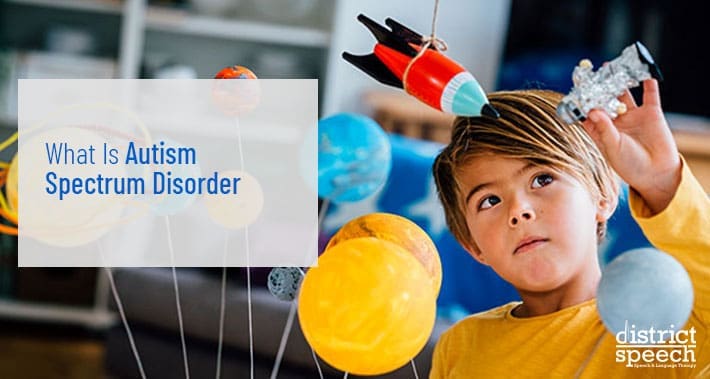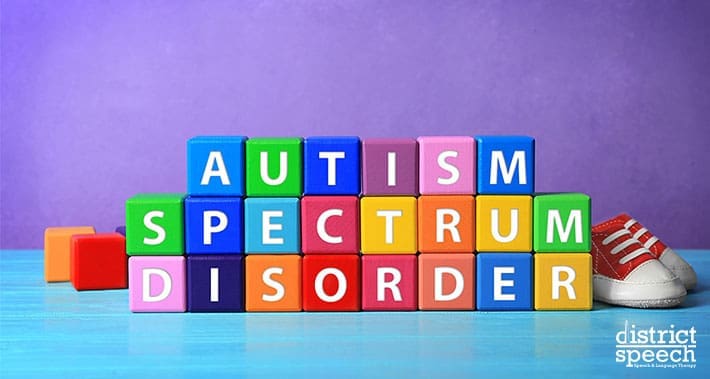
As a parent, you’re probably used to paying close attention to your child’s development.
Are they speaking on time?
Developing appropriate gross and fine motor skills?
Are they able to communicate?
Of course, development is different for every individual child.
However, experiencing a bump in the road, like a developmental disorder, can feel emotional and difficult.
If you suspect your child has a developmental disorder, like autism spectrum disorder, you might be full of questions.
Will your child develop at the same pace as their peers?
Will their life be more difficult because of their development?
These kinds of questions are normal for a parent.
If you think your child might have autism spectrum disorder, it’s important to learn more about autism.
That allows you to support your child as best they can while they navigate their own life.
There are many options for assessment and assistance for your child, including speech therapy for autism spectrum disorder offered at our Washington DC speech therapy clinic.
Autism spectrum disorder tends to begin showing symptoms around age two to four.
These symptoms can often manifest as loss of developed skills or difficulty gaining new ones.
Remember, an autism diagnosis for your child is not a bad thing.
A diagnosis gives you the tools and support you need to help your child thrive.
Let’s learn a little bit more about autism spectrum disorder and how it may affect your child.
What Is Autism Spectrum Disorder?
Autism spectrum disorder is a developmental disorder.
It’s usually characterized by trouble communicating, repetitive behaviors, and difficulty interpreting social cues, especially nonverbally.
Your child might begin to show traits of autism as early as toddlerhood.
Autism spectrum disorder is most often diagnosed in childhood.
However, it is not a “child only” disorder.
Autistic children do not grow out of their autism and will carry it with them to adulthood.
This isn’t a bad thing, though.
Many autistic people can thrive throughout their lifespan alongside the support and understanding of their families.
Remember, autism is a neurological condition, not a disease.
This means that people who have it have had it since birth, regardless of when they get a diagnosis.
Many autistic people lead happy and successful lives and need very little support as adults.
What Are The Signs Of Autism Spectrum Disorder?
Autism spectrum disorder is characterized by a wide range of symptoms, so it can be hard to recognize the signs of autism in your child.
Different people will experience each symptom to a different degree.
That’s why it’s called a spectrum, after all.
All autistic people have varying experiences.
However, a diagnosis can be a helpful tool for finding the support your child needs.
Below, you’ll find some of the most common signs of autism spectrum disorder.
Repetitive Behavioral Patterns
Autistic people tend to rely on routines and repetitive actions for structure and self soothing.
Often, this will appear as resistance to any kind of change in their usually daily activity.
You might also notice that your child has the desire to eat the same foods or do the same activities over and over.
Your child might also show repetitive physical behaviors, also known as stimming.
These include things like hand flapping, rocking back and forth, or spinning in circles.
Your child may also play with toys in an unusual way, like lining them up or sorting them by color and shape.
Your child may also show a lot of reluctance to go to places they’ve never been before.
Often, this is because new places are unpredictable, and to an autistic child, that can feel really scary.
This is why teletherapy sessions for speech therapy could be especially beneficial for your autistic child.
Social And Communications Issues
Autistic people can have differences in speech and language skills which can make communicating challenging.
In some children, this might look like partial or complete lack of speech.
You might also notice that your child speaks in a way that is repetitive, monotone, or sounds like babbling.
You may also hear your child communicate mainly in the form of repeated fragments of speech.
These fragments are typically things they hear from other people, TV, or movies.
This type of speech is also known as echolalia.
Autistic people often also experience challenges understanding and using nonverbal social cues to communicate.
You may notice that your child doesn’t make eye contact or has trouble interpreting body language.
Your child may also have difficulties with understanding facial expressions or other nonverbal conversational tools.

What Causes Autism Spectrum Disorder?
If you suspect your child has autism spectrum disorder, you probably have a lot of questions.
You may want to know why or how they developed autism.
Right now, the causes of autism spectrum disorder aren’t fully known.
However, we do know that autism is a neurodevelopmental disorder.
This means that your child’s brain has developed in a different way.
This is due to genetics, not anything that you have done as a parent.
It’s a common myth that parenting or vaccines can cause autism, but that’s just not true.
It’s also important to remember that autism is not a disease.
Your child can’t catch it from someone else who has it.
They’re just born with it.
How Can You Tell If Your Child Has Autism Spectrum Disorder?
We’ve already mentioned that autism has a variety of symptoms and no two people with autism have exactly the same experience.
However, there are some signs to look out for, especially in young children.
Some early signs of autism in children include:
- Not responding to their own name by one year old
- Avoiding eye contact
- Repetitive physical behaviors
- Unusual response to sensory stimuli, like sound
That is by no means a complete list of symptoms, but it is a starting point of some common symptoms to pay attention to.
How Can A Speech Therapist Help With Autism Spectrum Disorder?
When it comes to speech therapy treatments for autistic children, a primary focus is learning to communicate using language in addition to learning to speak.
This can present a unique challenge that can benefit from the help of a speech therapist, who often work with children who have trouble with social communication.
Early intervention and help from a speech therapist can help autistic children learn to communicate more effectively.
It can also help them learn to understand nonverbal social cues and interact in social situations.
For children who are partially or entirely nonverbal, a licensed speech therapist can work with their strengths and weaknesses to introduce alternative methods of communication.
This might include using a tablet or picture board to facilitate communication in a way that doesn’t require them to speak verbally.
Your child’s speech therapist may even introduce sign language to help your child communicate.
Late language emergence is common in autistic children, and speech therapists are very equipped to help your child develop their language skills.
However, early intervention is critical, as it has the most impact while your child is still learning language skills
RELATED: What’s The Best Age To Begin Speech Therapy?
Book Your Appointment With District Speech Today
If you think your child may have autism spectrum disorder, it’s important to remember that there is help available.
Your child is not alone on this journey, and neither are you.
District Speech can help assess whether your child’s developmental patterns fall within the autism spectrum.
We can work with you and your child to find support their development if they do.
Book your appointment with District Speech today.
1300 I St NW, Suite 400 E,
Washington, DC 20005
- https://g.page/districtspeech
District Speech and Language Therapy specializes in speech therapy, physical therapy, and occupational therapy solutions, for both children and adults, in the Washington D.C and the Arlington Virginia areas.